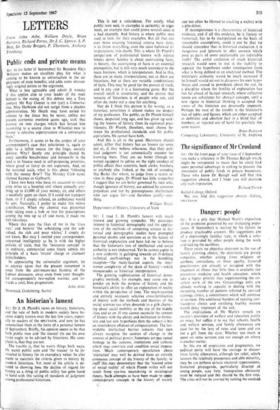Sir: I read J. H. Plumb's lament with much interest
and growing sympathy. My particular interest in historical demography and the applica- tion of the methods of computing science to his- torical and demographic studies have prompted personal doubts and questions as to the nature of historical explanation and have led me to believe that the historian's loss of intellectual and social authority is not undeserved. Yet he cannot aspire to a new authority in galloping towards an ill-defined technical methodology nor in the bumbling escapism—'the many-faceted aspects, the inter- woven complexity of the skein of history'—which masquerades as historical interpretation.
The growing sophistication of historical demo- graphic methods, for example, may cause one to ponder on both the purpose of history and the historian's ability to offer an explanation of reality within. the perspective of time. The much-vaunted and entirely necessary selective cross-fertilisation of history with the methods and theories of the social sciences too often descends to a glib chatter- ing about social mobility or the rise of the middle class and so on. If one cannot reconcile the content of history with the ability and inclination to formu- late and test new hypotheses-then-the subject is but an invertebrate offshoot of antiquarianism. The for- midable intellectual barrier remains that men always -recognise the sources of change in the sources of political power; historians yet pay casual homage to the customs, institutions and cultures which may constrain and condition social impera- tives. Much contemporary speculation about 'alienation' may well be derived from an entirely erroneous concept of the history of the family; in itself this may demonstrate that the 'trained sense of social reality' of which Plumb writes will not result from- eye-less meandering in sociological theory. Such attempts as have been made to apply contemporary concepts to the history of society can too often be likened to cracking a walnut with a pile-driver.
If incompleteness is a characteristic of historical- evidence, and if all this evidence, be it literary or numerical, has to be manipulated on the basis of reasonable assumptions, could it not be that we should remember that in historical evaluation it is dangerous and ignorant to offer answers which pose as parts of some unattainable yet indivisible truth? The awful confusion of much historical research would' seem to rest in the inability to separate the hypotheses under investigation from- what is being defined as an analytical method. The historian's authority would be much increased if he himself would set out to dis-prove his own hypo- theses and ceased to pontificate about the rest. In a discipline where the fertility of explanation has run far ahead of factual research, where collective nouns are substitutes for abstract concepts, until a new rigour in historical thinking is accepted the views of the historian are deservedly impotent. Perhaps the root of the trouble is the historian's fear of tables and figures, which are either accepted as definitive and absolute fact in a blind fear of numbers, or rejected out of hand for precisely the same reason.
Brian Burrows Computing Laboratory, University of St. Andrews






























 Previous page
Previous page